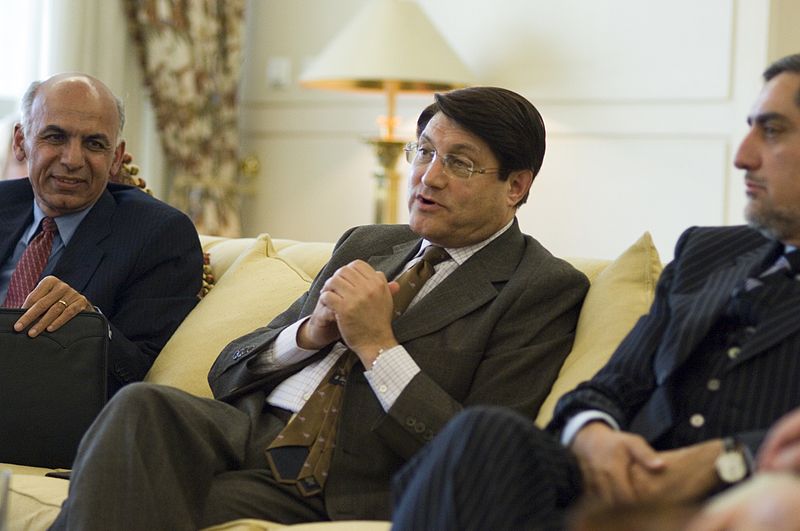
KABUL, Afghanistan—One is suave, debonair and well-groomed, often wearing bespoke suits and ascot ties. The other looks a bit like the famously ascetic Mahatma Gandhi and says he relaxes by reading centuries-old texts.
Afghanistan’s presidential campaign is going to a runoff between two candidates with little to distinguish them on issues but sharply different personal backgrounds and styles.
The first, former Foreign Minister Abdullah Abdullah, is a one-time aide to a famed warlord during the Afghan anti-Soviet guerrilla campaign. The second, ex-Finance Minister Ashraf Ghani Ahmadzai, is a Columbia University-educated anthropologist who spent much of the ‘90s working for the World Bank.
Both have promised to sign a deal to allow some U.S. forces to stay in Afghanistan after the end of the year and have emphasized in their campaign speeches that they will do “whatever is necessary” to advance peace—without offering specifics. With no visible differences in either candidate’s position on talks with the Taliban or relations with the U.S., the run-up to the June 14 final round is likely to be dominated by horse-trading among the country’s still powerful ethnic voting blocks.
After an inconclusive first round of voting in April, Afghan voters must now return to the polls to select a successor to President Hamid Karzai, a one-time close U.S. ally who lately has been more a thorn in its side. A peaceful transfer of power would offer some hope that the hundreds of billions of dollars spent and more than 2,000 American lives lost in the war to stabilize Afghanistan after more than three decades of conflict were not wasted.
The second round will likely feature a tight race, but some observers have raised concerns that the balloting will highlight ethnic fault lines in the country of 30 million.
Abdullah, 53, has both Pashtun and Tajik parentage. During the Soviet occupation in the 1980s, he served as adviser to and spokesman for Tajik warlord Ahmad Shah Massoud, who was assassinated by al-Qaida two days before the Sept. 11, 2001 attack.
In the early days after the U.S.-led alliance toppled the Taliban regime, Abdullah became the face of Afghanistan’s anti-Taliban movement, giving frequent press conferences to international media. He served as foreign minister and then was the runner-up in Karzai’s disputed re-election in 2009.
Ahmadzai, a 64-year-old Pashtun, received a Ph.D. in anthropology from Columbia University and taught at Johns Hopkins University during the years of Soviet occupation. He then began a career at the World Bank and was finance minister in the first post-Taliban government. He also ran in the 2009 election, coached by American campaign consultant James Carville, but received only 3 per cent of the vote.
Both candidates have named running mates chosen strategically from other ethnic groups, a Pashtun for Abdullah and an Uzbek for Ahmadzai.
Sagarika Dutt, a South Asian specialist at Nottingham Trent University in England, said that Afghanistan’s electoral politics “are still based on ethnic allegiances and affiliations, rather than on policies.”
Next month’s vote will also coincide with the height of the Taliban spring offensive that was launched earlier this week. The insurgency has renewed its campaign of attacks on the Afghan police and military, increasing fears over security when voters head to the polls.
The Taliban have pledged to disrupt the vote with bombings and other violence, although the first round on April 5 passed relatively peacefully.
Abdullah garnered 45 per cent of votes in the first round while Ahmadzai came in second with 31.6 per cent, Independent Election Commission Chairman Ahmad Yousuf Nouristani said. The final results were almost exactly the same as the preliminary results released late last month.
Abdullah said he was “certain” of carrying the second round, thanks to the wide cushion his first-round results give him, as well as endorsements he’s won from several of the smaller first round candidates, including third-place finisher Zalmai Rassoul—who was considered Karzai’s candidate of choice.
But it’s unclear whether Rassoul can deliver the votes of his supporters, who are largely Pashtuns, the country’s largest ethnic group.
Over 7 million Afghans voted in the first round, considered a strong turnout in an election plagued by Taliban threats and logistical hardships for both voters and poll workers.
U.S. representative James Dobbins expressed the hope that a successful election would be a step toward enticing the Taliban to agree to talks.
“We’re hopeful that the Taliban will reconsider their position and be willing to engage directly with us possibly, but even more importantly, directly with the Afghan government,” Dobbins said at a meeting in Tokyo of the International Contact Group for Afghanistan and Pakistan.
The head of the United Nations mission in Afghanistan commended the candidates for running “a hard-fought but positive campaign.”
“I hope that the prevailing respectful tone seen in the first round is preserved in the weeks ahead,” said Jan Kubis, the U.N. secretary general’s special representative for Afghanistan. “Candidates have a responsibility to call on their supporters to refrain from inflammatory rhetoric, intimidation, and threats.”
Associated Press writers Amir Shah in Kabul and Ken Moritsugu in Tokyo contributed to this report.